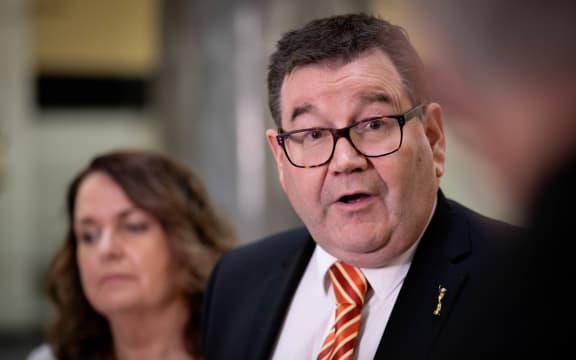Education Minister Jan Tinetti and Finance Minister Grant Robertson have announced extra funding for universities and tertiary institutions.
An additional $128 million will be invested to increase tuition subsidies at degree-level and above by a further 4 percent in 2024 and 2025.
This was in addition to the 5 percent increase provided at Budget 2023, which the government said was the most significant funding increase in 20 years.
"The government has heard the concerns of the sector," Tinetti said. "When we began our Budget process universities and other degree providers were forecasting enrolment increases. The opposite has occurred, and it is clear that there is a need for additional support."
She said universities were facing a significant decline in domestic enrolment, higher costs and fewer international students since the pandemic, and it was a global problem.
The new funding would help maintain the quality and variety of higher education subjects as well as research capability. It was vital for students, the tertiary workforce, the research system, and for the country's economic and social wellbeing.
"It will not resolve all the issues that universities are facing, but it should make a positive difference."
She said the new funding would go to all degree-granting institutions, including wānanga and Te Pūkenga.

Jan Tinetti and Grant Robertson. Photo: RNZ / Angus Dreaver
While the focus recently had been on staff and subject cuts at Victoria and Otago Universities, "other institutions have previously managed declines in student numbers", Tinetti said.
"We did not want to disadvantage those institutions which in some cases had already made difficult decisions."
Robertson said the new funding would be drawn from a transfer of underspends in Vote Tertiary Education, including from the fees-free scheme caused by lower than expected enrolments.
"This funding increase will help universities and other institutions deliver their strategic plans as agreed by their councils. The government expects the subsidy increase will be considered by when universities make final decisions on their offerings for 2024 and 2025."
Cabinet also wanted a report by the end of July on whether recently announced changes represented a threat to capability or provision of programmes nationwide.
The government will also review higher education funding, including the Performance-Based Research Fund. It will take two years, with its scope and approach to be decided by the the end of 2023.
"Having a look if it's fit for purpose," Tinetti told media on Tuesday, "and this will include the research-based funding as well which is incredibly important".
"We have a model of funding of tertiary education that has proved itself to be unsustainable," Robertson added, "and we have a number of different sources of funding that we need to think about altogether. So it's a review we've essentially given ourselves two years to get right... We would ask the universities - who are autonomous and do get to make the decisions about how that money is utilised - that they think about using the next two years to manage their way through as we do the funding review and ask them to look again at the proposals that they've made."
Victoria, which for a time was looking at changing its name to University of Wellington, prompted Robertson to say universities had spent "increasing" amounts on marketing, and questioned whether that was useful "in a country the size that we have".
"The flipside to that is, we also do have to respect institutional autonomy, our universities, our degree providers, play a really important critic and conscience role in our society and we need to respect that - but we're also the funding bodies, so we have a balance to strike there."
Robertson said when the Budget funding boost was announced, universities had been expecting enrolments to rise and to be posting surpluses this year, which for most had not eventuated.
He said the new funding was not a bail-out, "and we never said it was".
"Bear in mind that the two universities that have been most recently covered - Victoria and Otago - both have more staff now than they did before Covid. Other universities through the period of time recognised that given the funding system of bums on seats and enrolments that they needed to cut their cloth, different universities are in different circumstances."
It came as universities across Aotearoa were proposing staff and programme cuts.
Just last week, the Tertiary Education Union held a rally at Victoria University after vice-chancellor Nic Smith briefed staff on the university's latest proposals on cost-saving to address a forecast $33m deficit.
Branch president Dougal McNeill said the potential cuts would eliminate 229 full-time equivalent roles, and entire subjects including secondary teaching, German, Italian, Latin, tourism management, design technology and geophysics.
In April, it was reported several hundred University of Otago staff may be made redundant and further job cuts were likely as it grappled with a drop in enrolments.
Acting vice-chancellor Professor Helen Nicholson told students in an email the university was considering a number of hard decisions to ensure it was sustainable into the future.
"This includes the possible redundancies of several hundred academic and professional staff positions. Applications for voluntary redundancy will open next week, and more job cuts are likely later in the year."
Problems delayed, not solved
Tinetti said on Tuesday she had been in touch with Universities New Zealand and individual university leaders.
"When I have spoken to them this morning, pretty excited - Universities New Zealand have said that they're very excited about this prospect of a review."
Universities New Zealand chief executive Chris Whelan told Midday Report it would not completely cover the deficit universities were facing, but it was good to see the government stepping up.
It would "preserve the capability of our universities" as they struggled with enrolment numbers.

Chris Whelan. Photo: SUPPLIED
"It certainly delays a lot of the more difficult decisions universities are making, but it doesn't solve them… some are dealing with quite large deficits and the amounts that will be going to each individual university won't get even close to covering more than a moderate part of that gap, so the sector itself is still going to have to look at cuts - but hopefully it does mean we can preserve a lot of the areas that are a lot more valuable to the country in the long-term."
Whelan said the current volume-based funding system had been in place since 1991, and while student numbers were rising, it worked. But with student numbers declining, it was timely to review it.
But universities would have to keep looking for "sensible" cuts that preserved long-term capabilities.





